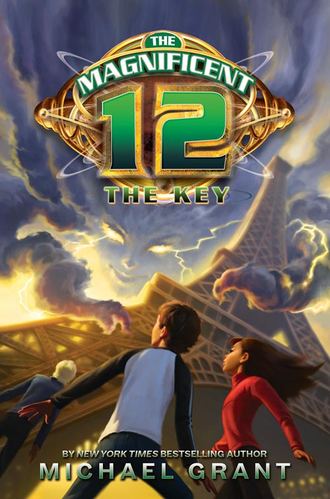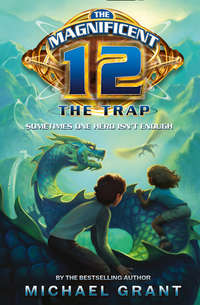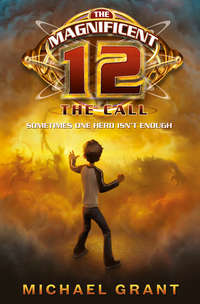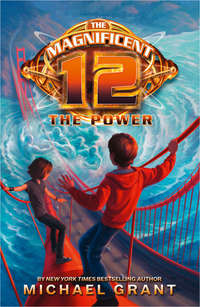
Полная версия
The Key
“If it’s William Blisterthöng MacGuffin, then we are talking about the same man,” Frank confirmed. His eyes narrowed and his sharp little fairy teeth showed behind tightened lips. “And you’ll never find him. Never! Never . . . without our help.”
“Why would you help us?” Mack asked.
Frank shrugged. “A friend of ours wants something in return. Something you might be able to get for her. One hand washes the other. I scratch your back, you scratch mine. Tit for tat.”
“Can we stop being cryptic, please, and get to the point?” Xiao asked politely. “My friend is not happy as a flower.”
Dietmar was unhappy with good reason—a pair of crows came swooping down and lit on Dietmar’s huge petals and began to pick at the seeds.
“Hey, hey, get out of here!” Jarrah waved them off, but they retreated only as far as a low tree branch and from there kept a close eye on Dietmar’s sunflower seeds.
“You tell the tale, Connie—you tell it best.” Frank indicated one of the female fairies, a dark-haired, dark-eyed, tiny little beauty in a deep-green formfitting outfit.
“How do you suppose MacGuffin came to be called Blisterthöng?” Connie asked rhetorically in an enchanting fairy voice. She kind of writhed or danced as she spoke. It was a sort of dramatic interpretation: she used sweeping hand gestures, and sometimes lowered her head in sadness, or threw open her arms to show joy. “For many long years after the Romans left, and after the druids faded, and as the new faith was coming to Scotland, the fairies lived in peace. We are a peaceable folk. No fairy has ever raised a hand in violence against another!” She made a very dramatic upraised-fist move on that last line.
Mack nodded thoughtfully because that seemed like the thing to do.
“Except for the Seventeen Year War,” Pete the fairy interjected.
“And the War of the Sweltering Cave,” Julia added helpfully. “And the Rabid Peace of Kilcannon’s Bluff.”
“With those few exceptions, no fairy had ever raised a hand in violence against another,” Connie reiterated, again with the upraised fist of forcefulness. “Unless you’re going to count the Battle of the Pretenders.”
“Or the Flaming Disagreement,” Frank said.
“Or the Pantsing of Fain’s Firth.”
“Or the Castle-Whacking Unpleasantness.”
“Or O’Toole’s Tools of Terror.”
“Or the War of the Noses.”
They went on like this for quite a while. And Mack began to wonder if the fairies were exaggerating their peacefulness.
“Or the Frightful Fruit Fight.”5
“Or Little Dora’s Comeuppance.”
Finally, after about ten minutes, they ran out of wars, skirmishes, misunderstandings, slaughters, backstabbings, and murdering peaces, and Connie got back to her main theme, which was, “Aside from those few6 minor matters, no fairy has ever raised a hand in violence against another.”
Fist for emphasis.
“Until . . . ,” Frank interjected with great drama and a dramatic flourish of his wand.
“Until William MacGuffin stole the Key and used it to take sides with the fairies of clan Gorse against clan Begonia.”
A strangled sound—much like a high-pitched human voice coming from inside a flower—came from the giant sunflower. Lacking lips, tongue, or teeth, Dietmar had a hard time expressing himself clearly, but it was something like, “See! I told you so. Those are flower names!”
Mack ignored him and waited for Connie to finish her story.
The crows looked speculatively, wondering if they could make a quick in-and-out dash. Some seeds, maybe a little eyeball . . .
“MacGuffin wanted gold, and as you know, fairies have plenty of it,” Connie said. “So for thirty pieces of gold MacGuffin gave the Gorse King new and more dangerous Vargran curses. Curses that gave the Gorse King power over the Begonias and our beloved All-Mother.”
“Is there any way we can hurry this along?” Jarrah complained. “I’m beginning to regret we didn’t eat those ice-cream bars ourselves.”
“MacGuffin helped the Gorse to formulate a terrible, terrible curse.” Connie made an interesting move here, jabbing her hands forward away from her mouth, like stabbing finger-tongues. “It was a curse that caused a hideous rash in the form of rose thorns to grow in the sensitive parts of a fairy body.”
“Yeesh,” Mack said, and winced.
“Ah,” Xiao said, nodding her head almost as smugly as Dietmar sometimes did. “Hence the name Blisterthöng.”
“For a thousand years we of clan Begonia have thirsted after his blood so that we might have our revenge,” Frank said, shaking his little peace-loving fist and baring his sharp peace-loving teeth.
“Because of your peaceful nature and all,” Mack said dryly. “We thought MacGuffin was dead. It’s been a thousand years.”
“No, he’s not dead. He’s concealed by a powerful spell of the Gorse King. His castle is invisible to human eyes. Only those with the enlightened puissance—and few humans possess it—can see him or his castle.”
“That’s why you need us.”
“Yes, Mack of the Magnifica. You and these others—but not you,” Frank said, pointing out Stefan, who shuffled in embarrassment, “possess the enlightened puissance. I can make it possible for you to see the Concealed Castle of MacGuffin. And I can make it possible for you to see the All-Mother, whom only a few have seen before. And even fewer have photographed. You must take the Key from MacGuffin. And you must swear to free the All-Mother from the Gorse King’s spell.”
“Wait, I’m losing track,” Jarrah said. “This All-Mother of yours has the Blisterthöng rash?”
The fairies looked at her like she was an idiot. Which Mack thought was unfair since he had wondered the same thing.
“No. Duh,” Frank said. “She’s trapped in the body of a sea serpent.”
It took a moment for the reality to percolate up through Mack’s brain. Don’t blame him for being a little slow. He was very bright, and very attentive, but already the day had involved near death-by-car-accident and a vanful of fairies. So if he was a little slow, hey, give him a break.
“Are you talking about the Loch Ness monster?” Mack asked.
Frank bridled a bit at that, unfurled his wings, and rose a few feet into the air. “She is Eimhur Ceana Una Mordag, All-Mother to clan Begonia, as well as Beloved of the Gods, the Ultimate Warrioress, and a past holder of the record for longest sustained note on the bagpipes—they say many who heard were driven mad.” Then he settled himself down and, with a shrug, said, “But yes, most know her as the Loch Ness monster.”
“Well then,” Jarrah said briskly, “magic castle, some old dead fart who makes fairies get rashes, and the Loch Ness monster: all in a day’s work.”

Meanwhile, at Richard Gere Middle School7
The golem stared at the phone. The message from Mack was very clear.
You have got to handle these things yourself. You have got to be a big boy now.
Yes. As usual, Mack had the right answer.
It was amazing, really, how right Mack was about, well, everything.
Clearly if the golem was a “big boy” then he could survive the shower. How much bigger? That was the question.
The golem began to text this question to Mack, but then stopped himself. You have got to handle these things yourself.

Yes, that was true, he supposed: responsibility. He would have to work it out himself.
Morning at school was always a confusing time for the golem. There were so many kids rushing this way and that, many saying, “Hi,” or, “Hey, weirdo,” or, “Get out of my way, you freak.” He tried to be pleasant to each and smile or say, “How are you today?” But it was hectic. Especially on days when Matthew Morgan would chain him to the bike rack or Camaro Angianelli would throw him into the bushes.
The golem didn’t quite understand what was going on—he was passing as Mack but he didn’t quite have Mack’s brains—but it seemed there was a sort of bully war going on at Richard Gere Middle School.8 Since Mack had left and taken Stefan Marr with him, the carefully negotiated bully peace had broken down.
Stefan had enforced peace among bullies by working out a complex system of assigned victims. Thus, under Stefan’s regime, there had been a bully for nerds, a bully for geeks, a bully for stoners, a bully for emo kids, a goths’ bully, a skaters’ bully, a rich kids’ bully—each bully with his or her own population of victims.
And of course one bully to rule them all, one bully to bind them, one bully to bring them all and in the darkness pound them. Which would be Stefan.
That system had worked surprisingly well. It kept kids from being “overbullied.” It wasn’t like just any bully could push a nerd around—only the designated bully of nerds could do that. And Stefan had established some limits. He had even conducted a bullying seminar, laying out what was and what was not acceptable bully behavior.
Yep. Those were the good old days.
Now, with the King of the Bullies off saving the world with Mack, everything was chaos. Suddenly bullies were trying to expand beyond their usual victim group. The emo bully had tried to claim that anyone who went to Hot Topic was, by definition, one of his rightful victims. This was opposed strongly by Ed Lafrontiere—the current Twilight fans’ bully—and this had set off a power struggle as various bullies tried to take over the title of King of the Bullies (or in the case of Camaro Angianelli, Queen).
Somehow the intrabully war had resulted in a sort of competition to see who could be the biggest bully to Mack. Or in fact: the golem.
His mom usually drove him to school in the morning. If by his mom, you meant Mack’s mom. The golem didn’t really have a mother, or a father. This was the first time in his brief life he’d had any sort of family, and they weren’t really his.
The golem had been formed and given life by Grimluk. He had suddenly opened his eyes in a tiny stone house on a distant hillside in . . . well, now that he thought about it, the golem wasn’t really sure where it was. Not around here, anyway.
He had begun to achieve consciousness when his head was formed. He had opened his eyes to see Grimluk’s ancient, grizzled, wrinkled, rheumy-eyed face staring down at him. Grimluk’s gnarled fingers had literally smoothed the mud that made the golem’s forehead.
The golem had blinked and looked around, confused. He was in some ways no different from a newborn baby.
He had looked down to see that his body was nothing but some tree branches—bark still on for better mud adherence9—tied together with rattan to form a sort of bare scarecrow form.
There was a massive wooden tub full of mud. And a smaller crockery pot with more sticks and loops of rattan.
“I’m getting too old for this,” Grimluk had muttered.
“Mama?” the golem had asked, gazing up hopefully.
“No, fool. You’re a golem. You have neither father nor mother. You have a maker. That’s me.”
“I . . . I feel like . . . like we should hug,” the golem had said.
Grimluk had been somewhat taken aback by this. But after he’d harrumphed a bit and chewed on his lip and forgotten what he was doing a few times and made some grunting noises and scratched and hitched up his robe, he’d finally said, “Eh? Let’s shake hands.”
Then after Grimluk had packed mud onto the golem’s stick arm and stuck in five twigs to act as supports for fingers and then carefully formed the hand, the golem had shaken hands with his maker.
“What’s my name?” the golem had asked.
“You don’t have one. Until I place the scroll in your mouth—and then you’ll know what part you are to play in the great events that rush toward us like an enraged boar.”
“What’s an enraged boar?”
“An angry wild pig.”
“What’s a pig?”
Grimluk was not a great teacher. The golem never did find out what a boar was. But Grimluk was a good golem maker.
When at last the golem was completed and stood on his own two muddy feet, Grimluk smiled a toothless smile. “All right, then.”
The golem had watched, mystified but also hopeful, as the elderly Magnifica, the sole surviving member of the first Magnificent Twelve, wrote two words on a slip of parchment.
The words were “Be Mack.”
“I don’t understand,” the golem said.
“You will,” Grimluk said. “Open your mouth and stick out your tongue.”
“What’s a mouth?”
Grimluk helped him understand that. Then he placed the scroll on the golem’s tongue.
What magic then!
The transformation was miraculous. The creature of mud and twigs suddenly had skin. He had eyes with whites and colored irises. He had hair. Fingernails.
Now, granted, Grimluk had sort of glossed over the internal organs—the golem would have to dig some of those out himself—but the result was a creature that looked very much like Mack MacAvoy.
So much like Mack that Mack’s best friends—those who knew him really well—were only a little suspicious. And his parents never guessed at all.
And then, he had met Mack face-to-face. A real human boy. The boy he was to be for however long it took Mack to save the world.
That had been kind of wonderful, meeting Mack.
But right now, here, today, he had no time for more nostalgia. He had to be a big boy now.
The question was: just how big?
He looked down and noticed that the mud-passing-as-flesh was oozing out over the tops of his shoes. And his jeans were already tight.
Yep: time to be a big boy.

William Blisterthöng MacGuffin’s castle turned out to be right there in the open atop a sheer outcropping, less than a quarter mile from Urquhart Castle, which was right beside Loch Ness.
Frank had chanted a Vargran spell over the Magnifica and Stefan, and the castle had appeared in perfect clarity. Big as life.
Then the fairies had urged them forward with encouraging words.
“Wait, you’re not coming with us?” Mack demanded.
“This could get violent,” Frank pointed out, “and we are peaceable folk.”
“No fairy has ever—” Connie started in, and Xiao, who was usually very polite, said, “Yeah, right.”
Over the years rare individuals who possessed just a little of the enlightened puissance had caught vague, fleeting glimpses of the castle. But when they reported this, they were condemned as drunk or crazy. Or as crazy drunks.
It was even worse for those few who would also report having seen a sort of sea serpent swimming around in Loch Ness. Those people were also derided as drunk or crazy or both, plus they were often compelled to write books and set up websites in a desperate attempt to prove that they were right.
They were right. But merely writing a book doesn’t prove you’re sane or sober (more the opposite).
Here’s what the local folk and passersby saw as Mack, Jarrah, Xiao, Stefan, and a nonflowery and rather annoyed Dietmar climbed the incredibly steep face of the hill: nothing. That’s what. Once Mack and the gang had come within a hundred feet of the massive promontory (there’s a word to dazzle your teacher with), they simply slipped from view. A person watching from the road would have seen five kids crossing a field and passing beneath a small stand of stunted trees, and then . . . nothing.
And here is what Stefan saw: also nothing. Because although Stefan had many great qualities, like, um . . . toughness and dangerousness . . . he did not possess the enlightened puissance. In fact, as far as Stefan could tell, the rest of them were crazy people gazing up at nothing.
This made it very difficult for Stefan to climb. He could feel the ground under his feet, he could even climb, but it was sketchy work. Try climbing something you can’t see. Go ahead, try. The story can wait.
See? It’s not easy, is it?
The climb was mostly over tumbled boulders. At some point back in history, the side of the mountain had crumbled. The other sides were all still nearly vertical cliff. But this side offered some possibilities for ascent.
So Jarrah held Stefan’s hand and guided him every step of the way with comments like, “Here you go, upsy-daisy, eh?” And, “Come on then, mate, just jump it.” And, “Nah, you won’t fall more than twenty feet, and that’s nothing.”
“I could fly up there in two seconds,” Xiao muttered. “Stupid treaties. Like I would be any kind of threat to those big, leathery, murderous, fire-breathing western dragons.”
“Still, it is a sort of law,” Dietmar said. “And we must obey the law.”
That remark seemed to lessen Xiao’s affection for Dietmar substantially. Xiao could get a very hard look in her eyes and set a very determined jaw when you annoyed her.
Mack brought up the rear, stepping cautiously and gazing up anxiously every few seconds to see just how little progress they had made. It was also his job as the leader to think of a plan for dealing with MacGuffin once they found him. So far his plan was to ask him very politely if they could have the Key, and would he mind releasing the Begonia clan’s All-Mother.
He did have one other idea. He yelled to Jarrah, who was at that moment in midair between boulders. “Jarrah, make sure your mom gets you the latest Vargran.”
“Done,” Jarrah said. She landed like a cat, stood up, pulled out her iPhone, and pointed to it with her free hand. “Nothing new: Mother is on holiday with Dad.” Then she was knocked over by Stefan, who had come to kind of like jumping over invisible boulders. From his point of view he was climbing in midair.
Vargran was the magical language, long forgotten, and only really useful to those very few who were born with the enlightened puissance. Jarrah’s mother was an archaeologist in Australia, where she had discovered some bits and pieces of Vargran carved into a cave wall inside the massive rock known as Uluru.
So far they had learned that Vargran had sounds that included a throat-clearing sound (ch), a click, and a sniff, as well as more normal consonants and vowels. And they had learned that Vargran had four basic verb forms: infinitive, past, future, and or else.
Generally magical spells involved the “or else” tense, which added a ma on the end.
To date they had used Vargran to make a small sun, to cause blue-cheese-filled Lepercons to grow, and to go shopping at Harrods department store, although they hadn’t really intended that last one.
The whole experience had not been very satisfying. Which was why they needed the Key. With MacGuffin’s key matched to the earlier piece of the key—the part they’d obtained from the goddess Nott—they would be able to learn a whole lot more Vargran. The language was, after all, their only weapon, and they didn’t have a lot of time left to assemble the rest of the twelve, somehow convince the traitorous Magnifica Valin to switch sides, and stop the Pale Queen. They needed Vargran. And no: there was no app for that.
About halfway up the mountain they had a lucky break: a stairway, carved into the cliff face. It had once gone all the way down, but when the mountain collapsed, so had the bottom half of the staircase—a fact that made Mack a bit nervous as he climbed his weary way up the narrow, overly tall steps.
It was a good thing they found the stairs because the sun was setting and casting very long, deep shadows all around them, turning every jagged rock into a monster’s head. (Not literally, that was a simile. Or possibly a metaphor. One of those.)
The staircase ended in a stone guardhouse. To their immense relief there was a fountain spouting what they fervently hoped was water. It wasn’t warm in Scotland, but it was humid, and they were all sweating and huffing and puffing, so they plopped down on stone benches, cupped water with their hands and drank, and gazed out across the landscape below: the road, Urquhart Castle, and the loch beyond.
Mack caught Stefan’s eye, and the two of them went to take a look up at MacGuffin’s castle. Darkness was falling fast. It was autumn in Scotland, when days are short and nights are long.
The castle was in perfect repair, not a ruin like Urquhart, which looked as ancient as it was. This castle looked as if it had just been built last week. The stone was clean and lichen-free. The mortar was all fresh. Even the grass below the walls looked green and new-mown.
Also, the row of skulls used to outline the massive timber door was impeccable. They stood out white against dark stone.
“Any way we can sneak in?” Mack wondered aloud.
“I can’t see anything,” Stefan pointed out. “It’s like I’m standing in the air looking at a cloud.”
“Ah. Right. Well, it’s got high walls, a couple of giant towers, and a massive wooden gate.”
“Human pyramid?” Stefan said, and for a moment Mack wasn’t entirely sure it was stupid.
“The walls are too high,” Mack said regretfully. “We need him to open the door. We need a diversion. We need him to come out after some of us while the rest sneak in and find the Key.”
Then, suddenly, without warning, came a sound so terrible Mack felt as if his blood had frozen solid in his veins.
Bleeeeeaaaat-skurrrreeeeeeeeee-waaahhhhhh!
“Oh my God, what is that?” Xiao cried. She had come running. “It sounds as if a goat is being tortured!”
“It sounds like all the pain in existence since the dawn of time!” Jarrah said.
“It sounds like the cry of a newborn demon ready to destroy all peace and love!” Dietmar said. “But I believe it is merely a bagpipe.”
“Oh, yeah,” Mack said. “A bagpipe. I was going to guess that.”
“So, who is going to be the diversion?” Jarrah asked after Mack described his plan, which wasn’t really much of a plan.
“You know . . . ,” Mack said, stroking his chin thoughtfully. “Something just occurred to me: maybe the door isn’t locked. I mean, it’s not like he gets many visitors up here. Why would he lock a door no one has come to in a thousand years?”
So they crept forward in single file with Mack in the lead. The bagpipe did not play again. There was a deep silence everywhere and the stars were beginning to blink on in the dark blue sky overhead.
The door was about ten feet tall, maybe eight feet wide, and made of wood that looked like it could be two feet thick. It was the kind of door Mack wished he had on his room. Maybe without the skulls grinning down. That was a little too much.
There wasn’t a handle, really, or a knocker or a bell. So Mack simply pushed on the wood where a handle might have been.
Instantly the bagpipe screeched, and this time that horrifying sound was joined by a chorus of shrill, high-pitched voices. It sounded like a church choir of toddlers cranked up on soda and Smarties trying to sing along with a howling devil.
“Interesting doorbell, eh?” Jarrah said. She was acting tough, but the noise had scared them all. All except Stefan, who yelled, “Hey, shut up!”
The chorus was instantly silenced. The door moved on its own, slowly widening the gap.
Mack was pretty sure duty required him to be the first one through, but fortunately Stefan pushed ahead. Stefan wasn’t good at fear. He just didn’t seem to get it. Even when he couldn’t see anything but the night sky.
Mack was right behind him, shoulder to shoulder with Jarrah, with Dietmar and Xiao following closely. They formed a little knot of scared kids.
The door slammed behind them.
They found themselves in a dark courtyard. Only the faint starlight revealed tall, crenellated walls and arches, with hard-on-the-feet cobblestones underfoot.
“Hey! I can see it now,” Stefan said. The spell of invisibility only worked on the exterior of the castle, like a coat of camouflage.




